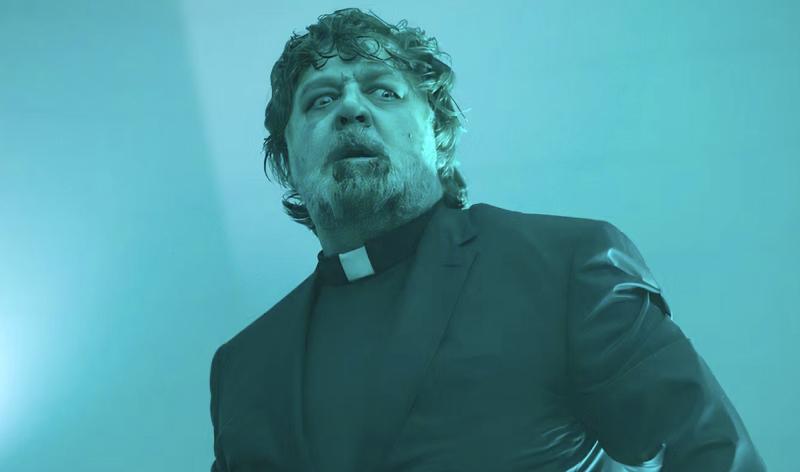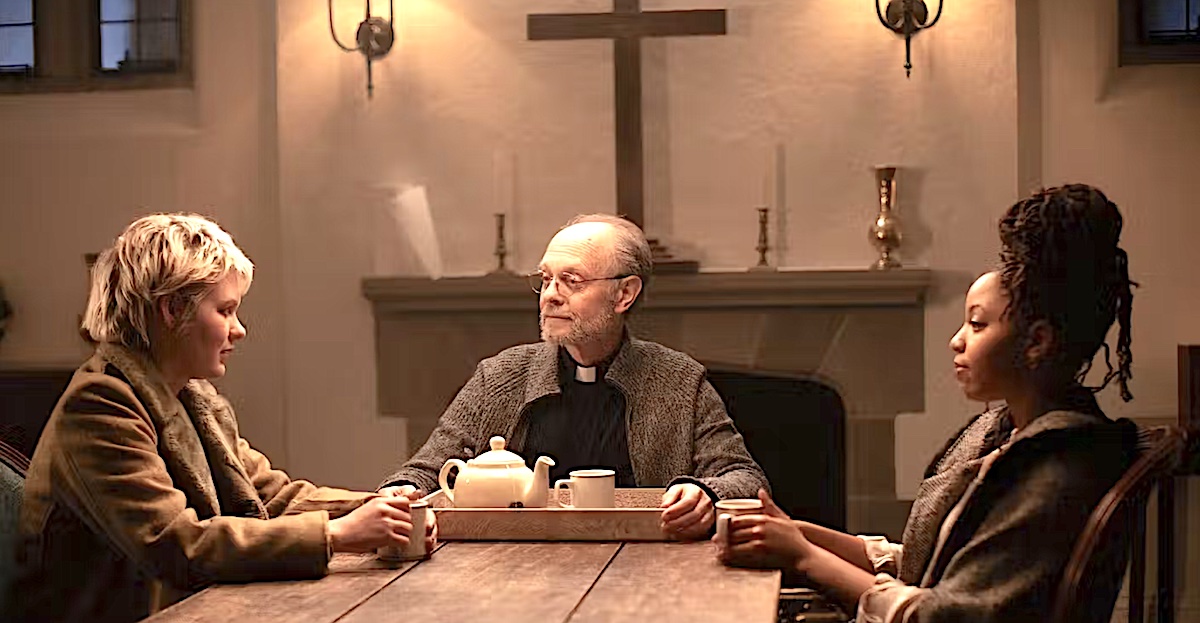The Exorcism review - salvaged horror movie is a diabolical mess | reviews, news & interviews
The Exorcism review - salvaged horror movie is a diabolical mess
The Exorcism review - salvaged horror movie is a diabolical mess
Russell Crowe fights losing battle against booze and the devil

Helpfully, this is a film that reviews itself. Like it says on the posters, “They were making a cursed movie. They were warned not to. They should have listened.”
If ever a film was meant not to be, here it is. Apparently it was going to be called The Georgetown Project, and writer-director Joshua John Miller shot the bulk of it in South Carolina in 2019. Then it was shelved, not least because of Covid. It was belatedly resurrected and some extra scenes added, but the botched-together result is dead on arrival.
Not the least perplexing thing about it is how Russell Crowe, who was once a copper-bottomed, ocean-going megastar, got involved in the first place. Perhaps there’s a kind of bleak irony in the fact that he plays failing movie star Anthony Miller, who has been wallowing in a self-destructive daze thanks to bereavement and far too much alcohol and is trying to make a comeback by starring in what appears to be a remake of The Exorcist. What nobody bargained for was that the production itself was going to be haunted by the devil, who bumped off the original actor whom Miller is replacing.
 But Crowe gets enough scenes here to suggest that this could have been a persuasive performance, had it been fully realised and framed within a coherent whole. Similarly, there’s some perfectly respectable work from Ryan Simpkins as his daughter Lee, trying to reconnect with her dad after his battle to beat the bottle, while David Hyde Pierce (Niles from Frasier) patiently impersonates Father Conor, a kindly priest (and trained psychologist) who provides on-set spiritual guidance (pictured above, Simpkins, Pierce and Chloe Bailey).
But Crowe gets enough scenes here to suggest that this could have been a persuasive performance, had it been fully realised and framed within a coherent whole. Similarly, there’s some perfectly respectable work from Ryan Simpkins as his daughter Lee, trying to reconnect with her dad after his battle to beat the bottle, while David Hyde Pierce (Niles from Frasier) patiently impersonates Father Conor, a kindly priest (and trained psychologist) who provides on-set spiritual guidance (pictured above, Simpkins, Pierce and Chloe Bailey).
But the film’s fragmented gestation has left it feeling like a bin full of leftovers. Scenes merely happen, with no sense of logical development. There’s no coherent sense of place, and it’s impossible to tell whether scenes from Miller’s tormented private life are talking place in his apartment or on the film’s elaborately constructed set. The story tracks the film’s progress via captions saying “Shoot, Day Nine” or whatever, but since the addled Miller can’t remember his lines it’s difficult to see how they can shoot anything at all. Peter, the film’s director, is played like a sadistic torturer by Adam Goldberg, whose idea of motivation is to remind Miller of how he betrayed his terminally-ill wife and is a despicable failure as a human being. Brief glimpses of Sam Worthington suggest that he was scheduled for a bigger role that didn’t materialise.
Long story short, the devil rides in and everything goes to hell. Thank heavens for small mercies.
The future of Arts Journalism
You can stop theartsdesk.com closing!
We urgently need financing to survive. Our fundraising drive has thus far raised £49,000 but we need to reach £100,000 or we will be forced to close. Please contribute here: https://gofund.me/c3f6033d
And if you can forward this information to anyone who might assist, we’d be grateful.

Subscribe to theartsdesk.com
Thank you for continuing to read our work on theartsdesk.com. For unlimited access to every article in its entirety, including our archive of more than 15,000 pieces, we're asking for £5 per month or £40 per year. We feel it's a very good deal, and hope you do too.
To take a subscription now simply click here.
And if you're looking for that extra gift for a friend or family member, why not treat them to a theartsdesk.com gift subscription?
more Film
 Urchin review - superb homeless drama
Frank Dillane gives a star-making turn in Harris Dickinson’s impressive directorial debut
Urchin review - superb homeless drama
Frank Dillane gives a star-making turn in Harris Dickinson’s impressive directorial debut
 Mr Blake at Your Service review - John Malkovich in unlikely role as an English butler
Weird comedy directed by novelist Gilles Legardinier
Mr Blake at Your Service review - John Malkovich in unlikely role as an English butler
Weird comedy directed by novelist Gilles Legardinier
 Don't Let's Go to the Dogs Tonight review - vivid adaptation of a memoir about a Rhodesian childhood
Embeth Davidtz delivers an impressive directing debut and an exceptional child star
Don't Let's Go to the Dogs Tonight review - vivid adaptation of a memoir about a Rhodesian childhood
Embeth Davidtz delivers an impressive directing debut and an exceptional child star
 One Battle After Another review - Paul Thomas Anderson satirises America's culture wars
Leonardo DiCaprio, Teyana Taylor, and Sean Penn star in a rollercoasting political thriller
One Battle After Another review - Paul Thomas Anderson satirises America's culture wars
Leonardo DiCaprio, Teyana Taylor, and Sean Penn star in a rollercoasting political thriller
 Steve review - educator in crisis
Cillian Murphy excels as a troubled headmaster working with delinquent boys
Steve review - educator in crisis
Cillian Murphy excels as a troubled headmaster working with delinquent boys
 Can I get a Witness? review - time to die before you get old
Ann Marie Fleming directs Sandra Oh in dystopian fantasy that fails to ignite
Can I get a Witness? review - time to die before you get old
Ann Marie Fleming directs Sandra Oh in dystopian fantasy that fails to ignite
 Happyend review - the kids are never alright
In this futuristic blackboard jungle everything is a bit too manicured
Happyend review - the kids are never alright
In this futuristic blackboard jungle everything is a bit too manicured
 Robert Redford (1936-2025)
The star was more admired within the screen trade than by the critics
Robert Redford (1936-2025)
The star was more admired within the screen trade than by the critics
 Blu-ray: The Sons of Great Bear
DEFA's first 'Red Western': a revisionist take on colonial expansion
Blu-ray: The Sons of Great Bear
DEFA's first 'Red Western': a revisionist take on colonial expansion
 Spinal Tap II: The End Continues review - comedy rock band fails to revive past glories
Belated satirical sequel runs out of gas
Spinal Tap II: The End Continues review - comedy rock band fails to revive past glories
Belated satirical sequel runs out of gas

Add comment